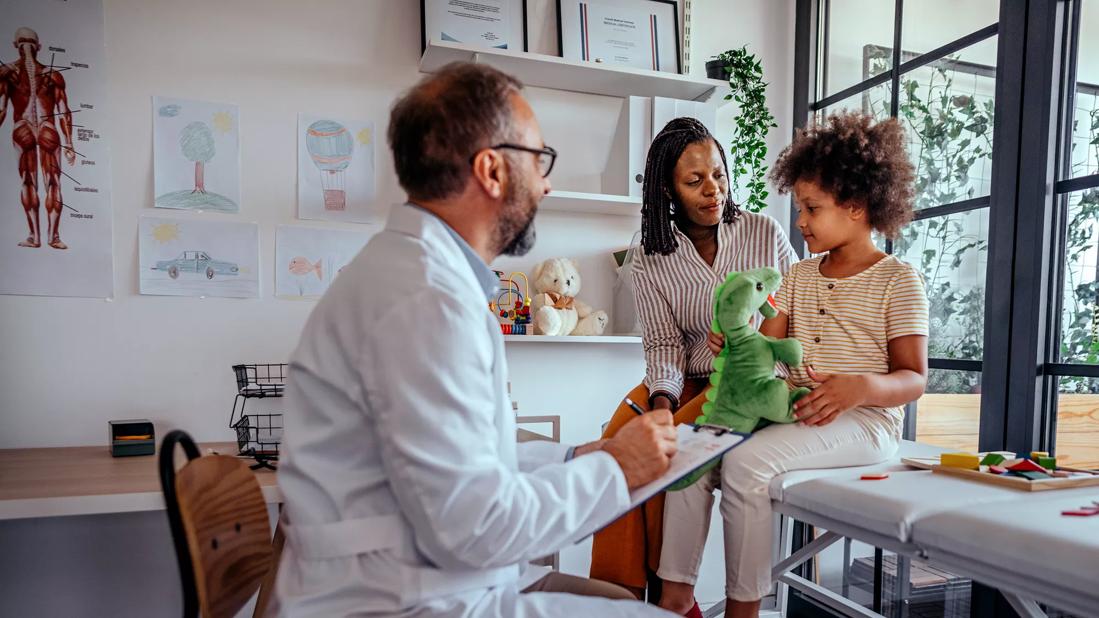This therapy may be recommended at any age, but it’s commonly started before puberty

Image content: This image is available to view online.
View image online (https://assets.clevelandclinic.org/transform/322afd80-6cb4-4f2c-8a5d-dc0a004ad259/doctor-child-appointment-1353222558)
Caregiver and child with doctor in kid-friendly pediatrician office
As a parent or caregiver, you hope that your child grows up to be healthy and strong. And as with many things in life, you may need some assistance to reach that goal, especially if your child has been diagnosed with a growth hormone deficiency (GHD).
Advertisement
Cleveland Clinic is a non-profit academic medical center. Advertising on our site helps support our mission. We do not endorse non-Cleveland Clinic products or services. Policy
“Growth hormone deficiency refers to a condition where a child makes inadequate growth hormone to support normal growth,” explains pediatric endocrinologist Roy Kim, MD. “Growth hormone is produced by a gland in our brain called the pituitary gland. And growth hormone deficiency is one among several conditions that can cause poor height growth.”
To help treat growth hormone deficiency, your child’s pediatrician may recommend growth hormone therapy,s or HGH therapy, which is a series of medications used to stimulate the body to make growth factors.
Growth hormone therapy can be used to help children at any age, but what’s the best age to start?
Dr. Kim breaks down how growth hormone for kids works and if there’s a good age to start a child on growth hormone therapy.
When your child has a growth hormone deficiency, their pituitary gland doesn’t make enough growth hormone.
“The goal with therapy is to give the body back what would normally be made,” clarifies Dr. Kim. “After we inject growth hormone under the skin, it circulates in our body. And it stimulates the liver to make growth factors. And it’s these growth factors that do things like make our bones longer, grows our muscles and, to some extent, it grows our organs, too.”
Advertisement
Your pediatrician will determine the right dosage for your child. Growth hormone therapy can be given at home by an adult through a daily or weekly subcutaneous injection.
Dr. Kim shares that growth hormone therapy can be started at any age. He commonly sees children who are in elementary school or are around the onset of puberty. They’re typically referred to him because they’re considered short for their age or have been growing slowly. But, he says that even some infants may benefit from growth hormone therapy.
“Infants can be born with growth hormone deficiency. They may have a complication where their blood glucose is too low, which is called hypoglycemia. This could be due to the abnormal pituitary gland development, so the baby may lack growth hormone, as well as other hormones,” he explains.
Growth hormone deficiency can happen in children due to brain tumors, head injury and in other situations such as children who receive chemotherapy or radiation therapy for pediatric cancers. Growth hormone treatment can benefit slowly growing children with other medical conditions such as chronic kidney disease, Turner syndrome and Prader-Willi syndrome, even though they don’t technically have growth hormone deficiency.
“We think it’s important for children who have growth hormone deficiency to be diagnosed before the pubertal growth spurt so they have a good growth spurt and grow to their full potential,” adds Dr. Kim.
It’s worth noting that most children won’t need to continue growth hormone therapy as adults.
Today, growth hormones are made in a lab and are considered safe, says Dr. Kim.
Growth hormone therapy can cause certain side effects, though, such as:
Dr. Kim notes that if your child has diabetes, growth hormone therapy can make their blood sugar high. But he stresses that it doesn’t on its own cause diabetes.
Also, as growth hormone therapy promotes rapid growth within your child, there’s a chance it can magnify scoliosis. But again, Dr. Kim stresses that growth hormones don’t seem to be a cause of scoliosis.
And in rare cases, some children may experience problems with their hips known as slipped capital femoral epiphyses (SCFE). Your child’s healthcare team will monitor their progress during routine appointments.
When it comes to seeing promising results in your child’s development and growth, Dr. Kim says you can expect to see changes within six months of treatment.
Advertisement
It can be overwhelming and scary to think that your child needs growth hormone therapy. But Dr. Kim says it’s vital that you talk to your child’s healthcare providers about any questions you may have before, during and after the treatment process. They’ll do their best to make sure you and your child are prepared and informed.
Advertisement

Sign up for our Health Essentials emails for expert guidance on nutrition, fitness, sleep, skin care and more.
Learn more about our editorial process.
Advertisement
Most teething symptoms are mild — fevers and other major symptoms are likely something else
This common sitting position for kids can cause problems with joint health, muscle development and motor coordination
Track your blood sugar levels and pay attention to any symptoms, like feeling thirstier than normal
Prioritize your health by managing stress, strengthening your social connections and getting quality sleep
Gentle care, like moisturizing, washing and soft brushing, can help clear up cradle cap
The benefits of these drugs typically outweigh potential risks — but talking about your eye health and GLP-1s with your provider is advised
Babies are born with very little of this vitamin, which plays a critical role in the blood clotting process
Teaching your baby to sign may help ease frustrations before they can talk, but it’s not a must-do
Prioritize your health by managing stress, strengthening your social connections and getting quality sleep
Bolsters, blankets, pillows and blocks can offer extra support, stability and comfort
Allergies, postnasal drip, asthma or reflux could be to blame for a cough that won’t quit